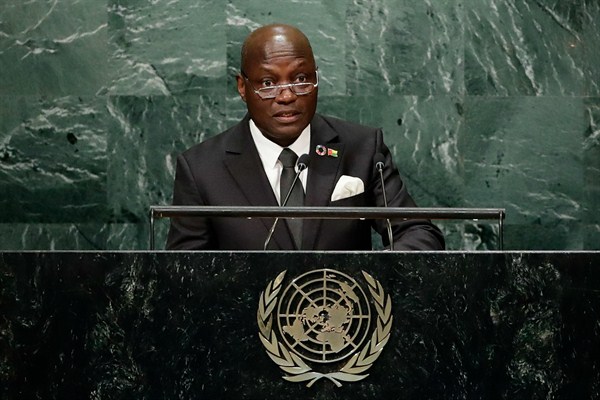Earlier this month, Guinea-Bissau’s political factions agreed to a six-point roadmap to form a consensus government and end more than a year of deadlock. Although the ambitious plan is a positive step toward ending the small West African country’s political crisis, the deal is unlikely to overcome the deep divisions within Guinea-Bissau’s parliament or address the fundamental drivers of instability. Moreover, the planned withdrawal of an Economic Community of West African States (ECOWAS) peacekeeping mission in mid-2017 will allow Guinea-Bissau’s military to play a greater role in politics, raising the possibility of a coup in the next two years.
Guinea-Bissau’s political institutions have been in a state of near constant paralysis since mid-2015, as a result of President Jose Mario Vaz’s efforts to sideline the majority faction of the ruling African Party for the Independence of Guinea and Cape Verde, or PAIGC. The dispute escalated in August 2015 when Vaz dismissed Prime Minister Domingos Simoes Pereira, claiming his government was not functioning effectively. The move provoked outrage among PAIGC parliamentarians, who used their majority to block key pieces of legislation, including the 2016 budget. In May 2016, Vaz dismissed the newly appointed Prime Minister Carlos Correia, again claiming his government was not functioning, replacing him with a Vaz ally, Baciro Dja. That drew allegations of a “presidential coup”; the country’s Supreme Court ultimately approved the appointment, but only after widespread allegations of political interference by the president.
No elected government has ever completed its term in Guinea-Bissau, which declared its independence from Portugal in 1973 and has suffered nine coups or attempted coups since 1980. So fears that the latest crisis could destabilize the country further are hardly overstated. Responding to these concerns, regional mediators led by Guinea’s president, Alpha Conde, and his counterpart from Sierra Leone, Ernest Bai Koroma, traveled to Guinea-Bissau in early September and met the main government and opposition stakeholders.

